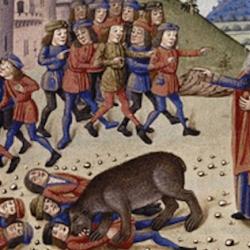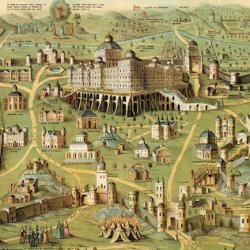INTRODUCTION
At the end of the previous chapter, Elijah ?ran before?EAhab back to Jezreel. This is not just a sign of the Lord?s empowerment of Elijah; it is an offer to Ahab to receive Elijah as his chief advisor. As soon as Ahab tells Jezebel about it, however, that arrangement goes down the drain, and the covenant renewal accomplished at Carmel is quickly reversed. In response, Elijah goes to Horeb/Sinai to bring an accusation against Israel and the house of Ahab.
THE TEXT
?And Ahab told Jezebel all that Elijah had done, also how he had executed all the prophets with the sword. Then Jezebel sent a messenger to Elijah, saying, ?So let the gods do to me, and more also, if I do not make your life as the life of one of them by tomorrow about this time?E . . . .?E(1 Kings 19:1-21).
STRUCTURE
Verses 1-8 form a section. Jezebel begins to attack the prophets of Yahweh once again, and Elijah leaves (v. 3). After staying under the tree for a time, he arises again and goes to Horeb (v. 8). This section contains a number of ?doubles?E Elijah?s journey is broken into two stages (vv. 2-8, 8); the juniper tree is mentioned twice (vv. 4, 5); the angel comes to him twice to touch him (vv. 5, 7); he falls asleep twice (vv. 5, 6), and twice is told to arise to eat and drink (vv. 5, 7). Elijah?s encounter with Yahweh at Sinai is organized in a neat parallel structure, giving the event a formal and almost liturgical feel:
A. Elijah in cave; Lord asks, ?What are you doing here??Ev 9
B. Elijah?s answer: ?I alone am left,?Ev 10
C. Lord?s command: ?Go,?Ev 11a
D. Lord?s appearance, vv 11b-13a (Lord?s words?)
-wind
-earthquake
-fire
-climax: sheer silence/gentle blowing
A?E Elijah before cave; Lord asks, ?What are you doing here??Ev 13b
B?E Elijah?s answer: ?I alone am left,?Ev 14
C. Lord?s command: ?Go,?Ev 15a
D. Lord?s extended command: threefold anointing, vv 15b-18
-anoint Hazael
-anoint Jehu
-anoint Elisha
-climax: leave 7000
FEARFUL PROPHET?
Many see this passage as a story about Elijah losing it. He becomes fearful of Jezebel, flees the land, whines and complains, even going so far as to exaggerate his isolation as a prophet. This doesn?t look like the Elijah we?ve seen in the earlier chapters, and Dale Ralph Davis does a great job of refuting this interpretation. First, the Hebrew text of verse 3 does not say that Elijah ?feared?Ebut that he ?saw.?EFurther, the word for ?flee?Eis simply a Hebrew word for ?go?Eor even ?walk.?EProphets are ?eyes of Yahweh?Ethat ?walk?Eto and fro on the earth, collecting ?evidence?Eto present before the Lord (Zechariah 4:10). ?Eyes?Eare organs of discernment and judgment in Scripture (Genesis 1; Psalm 11). As a prophet, Elijah ?sees?EJezebel?s plan, and also perceives that Jezebel and not Ahab is really in charge of royal policy. So he leaves; as in chapter 17, Elijah?s withdrawal is a judgment on Israel.
Second, Davis also points to Elijah?s route. If Elijah is running away from Jezebel, he goes an awful long way from home. Beersheba is at the very southern edge of Judah, and then he goes on to Sinai, another couple hundred miles beyond Beersheba. This is not flight. This is a journey to a specific destination.
Third, it is true that Elijah wishes to die. But this is not simple despair. He realizes that he has been no more effective than his prophetic ?fathers?Ein calling Israel back to the covenant. He knows that as a prophet he is bound to bring an accusation against Israel. Like Jonah, he is reluctant to do this; Elijah would rather die than stand against Israel in this fashion. Perhaps he is also a Moses figure here, desiring to die for the sake of Israel (as the apostle Paul was as well). Besides, Elijah does not remain in this state of mind. He lies down (a symbolic death), but the angel raises him up and feeds him (a symbolic resurrection). Refreshed by food baked on ?live coals?E(cf. Isaiah 6), he continues to his destination, Sinai.
ACCUSER OF ISRAEL
When Elijah arrives at Sinai, Yahweh asks him to ?state his purpose,?Eand Elijah does just that. He is a prophet, who has standing in the court of Yahweh to listen to the sentences passed and to offer his briefs on behalf of the people. Elijah is convinced that things are beyond repair, and he presents evidence for the prosecution. Yahweh tells him to ?stand,?Ewhich means that he is to assume his prophetic role (v. 11). God comes roaring to Him in wind, earthquake, and fire, and then comes in a voice. Wind, earthquake, and fire are often associated in Scripture with Yahweh?s coming (2 Samuel 22:11; Psalm 11:6; 104:3; Isaiah 29:6; etc.), but Kings emphasizes that Yahweh is fundamentally associated with His Word than with any other phenomena. He is in His voice. Yahweh?s appearance in wind, earthquake, and fire is also a picture of what Yahweh will do with Israel. He is going to shake Israel down, but after He will speak quietly to His people, like a husband wooing back his wayward bride (cf. Hosea 2:14-20).
Elijah insists that he has been jealous (zealous) for Yahweh, just as Yahweh is for Israel. His emphasis is on Israel?s turning from Yahweh?s covenant, altars, and prophets. He?s not whining about his own failure; He?s accusing Israel of breaking covenant. Unlike Moses, who also saw Yahweh?s glory on Sinai, he does not intercede for Israel, but instead accuses Israel. Yahweh apparently agrees with Elijah?s assessment of things. This is the strongest evidence that Elijah is not ?losing it?E Yahweh concurs with Elijah?s accusation, and gives him three tasks that lead to the overthrow of Ahab?s house: Hazael (a Gentile) and Jehu (an Israelite) are appointed as the two swords of Yahweh, and Elisha is anointed to clean up after them. Yahweh also promises to leave a remnant, seeds of a new Israel.
ELISHA
The first task that Elijah takes up is calling Elisha, as Moses designed Joshua as his successor. Just as Joshua received a portion of the spirit of Moses, so Elisha receives of the spirit of Elijah. The call is symbolically fraught. Elisha is plowing with the twelfth of twelve pairs of oxen, a picture of his later ?yoking?Eand ?guiding?Eof Israel. As a plowman, Elisha prepares the ground for planting the seeds of a new Israel. Given his place in Israel?s history, he is a plowman who beats his plow to a sword. Elijah ?passes by?EElisha, as Yahweh passes by him on Sinai (19:11), and throws the mantle of prophetic office over his shoulders. This investiture with a prophetic mantle apparently serves as Elisha?s ?anointing.?EElisha does to back to his parents, but it?s clear that he has accepted the prophetic call, since he burns the yoke that he has been using. He becomes an apprentice to Elijah, so that he might become like his master.
Catechism for Little Saints
Why does Elijah leave Israel?
Because he sees what Jezebel is doing, and as a prophet he has to accuse Israel before the Lord.
What is Elijah?s accusation against Israel?
Israel has abandoned the Lord, His covenant, His worship, and His prophets.











